calsfoundation@cals.org
Sam Epstein (1875–1944)
Sam Epstein, a Russian-Jewish immigrant, was a merchant, planter, and civic leader in Lake Village (Chicot County) and Chicot County in the early twentieth century.
Sam Epstein was born to Menasha Epstein and Malke Epstein on July 25, 1875, on a farm near Riga, Latvia, in the former Russian Empire. He was likely the second of five children. Many Eastern European Jews fled violence and legal restrictions in the late nineteenth and early twentieth centuries. While Epstein’s parents likely did not immigrate, at least five of their children, including Sam, arrived in the United States between 1891 and 1900. Epstein likely arrived in New York City in May 1896. He traveled to Memphis, Tennessee, and joined an older brother, Nathan, who had immigrated in October 1891 with his wife, Rosa. The brothers resided in or near the Pinch District, a growing immigrant neighborhood with a significant Jewish population.
Nathan, supplied by a wholesaler in Memphis, started out as a peddler around 1892, traveling around towns and landings along the Mississippi River while his family remained in Memphis. When Sam Epstein arrived in Memphis around 1897, he followed his brother’s path as a peddler. By the late 1890s, the brothers had a mercantile business at Luna Landing in Chicot County. Luna Landing, which was on the Mississippi River and near the north shore of Lake Chicot, had emerged by the late 1890s as an important regional trade center with a steamboat landing for passengers and goods, a ferry crossing the river to Greenville, Mississippi, and a nearly completed railroad.
Epstein started his own business around 1900 in Lake Village, the county seat on the western edge of Lake Chicot. Initially, it was located on the west end of downtown Lake Village, and the store’s merchandise was brought in via Lake Chicot; beginning in 1901, the railroad brought merchandise in from Luna Landing. Epstein reportedly saved money and slept on a counter at the back of the store until 1907, when he married Becke Ruth Eisenberg, daughter of Russian immigrants, of Little Rock (Pulaski County). They had three daughters: Helen, Sylvia, and Melyvn.
The Epstein store sold dry goods and integrated into the local cotton economy by supplying credit to local farmers. In 1930, Epstein reported that he supplied about 300 tenants farming on his land with credit. Their debt would be settled in the fall when cotton, the cash crop, was harvested.
After his move into Lake Village, Epstein became more involved in civic affairs. He helped incorporate the town of Lake Village by signing a letter of support for annexing land into the city. He was also a strong supporter of the local drainage district and levee boards. By 1910, he began construction on a two-story, wood-frame Colonial Revival house along Lakeshore Drive in Lake Village. The house was added to the National Register of Historic Places in 1992 for its association with Epstein and his significance in Chicot County commerce, community planning, and the county’s ethnic Jewish heritage. The house burned in June 2012.
Managing his agricultural interests became Epstein’s life’s work as he purchased land from individuals and families. Epstein’s daughter recalled in a 1982 interview: “He liked farming more than the store….He just started buying land….On Sundays we would take him out in the car [and] he would get out and walk the whole field.” In November 1927, he purchased the Lakeport Plantation, approximately 1,000 acres, from Victor Johnson for $30,000. The purchase included the 1859 Lakeport Plantation house. His daughter, Sylvia Angel, and grandson, Rodney Angel, were instrumental in placing the house on the National Register in 1974. In 2001, grandson Sam Epstein Angel donated the house to Arkansas State University, and it is was restored to serve as a museum.
In 1910, Nathan erected a cotton gin at Luna Landing. In 1911 and 1912, respectively, Nathan sold his cotton gin and the store at Luna Landing to Epstein. In 1914, Nathan died in a farming accident at Luna, and Epstein became the executor of his estate. In 1918, after debts were settled, he purchased the remainder of his brother’s estate. Sometime before 1917, Epstein opened a gin in Lake Village; he closed the gin at Luna around 1919. By 1930, the Epstein Gin employed an average of fifteen workers, and was the largest gin in Lake Village and second largest in the county.
As Epstein focused on farming and ginning, his wife took over the Lake Village store, transforming it from a dry goods store into a department store. In 1918, the store moved into the first floor of the Tushek Building near the courthouse. In 1954, the store relocated to a new, modern storefront in downtown Lake Village. After Becke Epstein’s death in 1963, her daughters continued to operate the store until it closed in 1975.
Memphis, with its large Orthodox Jewish community, remained an important family and religious center for the Epsteins into the 1930s, when they began attending services at the Hebrew Union Temple, a reform congregation, in Greenville.
Sam Epstein died on June 19, 1944. At the time of his death, his estate had more than 10,000 acres and one of the largest cotton gins in the region. Epstein is buried in the Jewish Cemetery in Greenville. The Epstein Gin, Epstein Land Company, and Epstein-Festinger-White Land Company are still operated by his descendants in the twenty-first century.
For additional information:
Carolyn LeMaster Jewish History Collection. Butler Center for Arkansas Studies. Central Arkansas Library System, Little Rock, Arkansas.
“Epsteins Announce They Are Going Out of Business.” Chicot Spectator, August 13, 1975, pp. 1–2.
LeMaster, Carolyn Gray. A Corner of the Tapestry: A History of the Jewish Experience in Arkansas, 1820s–1990s. Fayetteville: University of Arkansas Press, 1994.
“Sam Epstein Dies at Lake Village; Funeral Tuesday.” Delta Democrat-Times (Greenville, Mississippi), June 19, 1944, p. 5.
“Sam Epstein Dies at Lake Village Monday Morning.” Dermott News, June 22, 1944, p. 1.
Blake Wintory
Lakeport Plantation
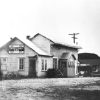 Cotton Gins
Cotton Gins Early Twentieth Century, 1901 through 1940
Early Twentieth Century, 1901 through 1940 ACF Logo
ACF Logo 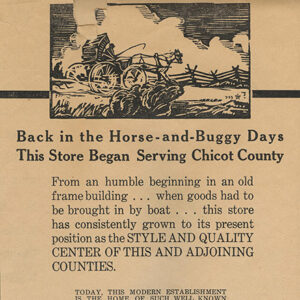 Epstein's Store Ad
Epstein's Store Ad 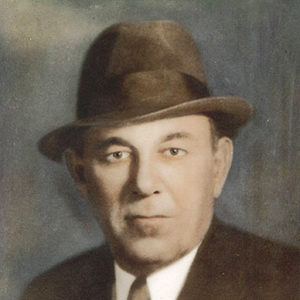 Sam Epstein
Sam Epstein 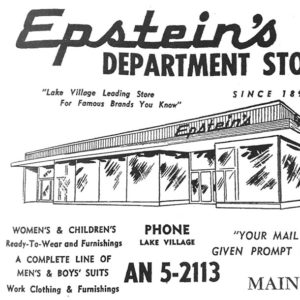 Epstein's Ad
Epstein's Ad 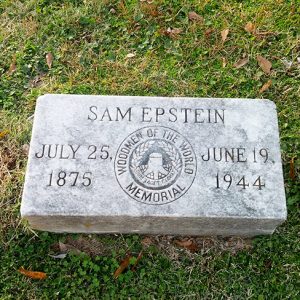 Sam Epstein Headstone
Sam Epstein Headstone 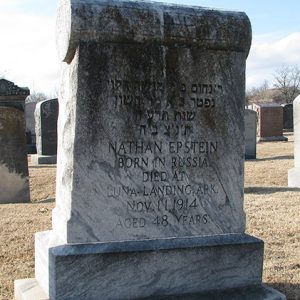 Nathan Epstein Headstone
Nathan Epstein Headstone 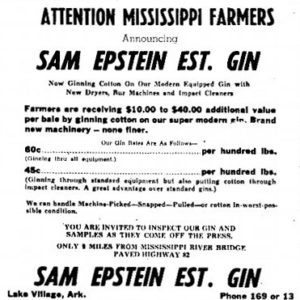 Epstein Gin Ad
Epstein Gin Ad 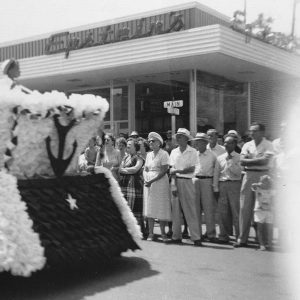 Epstein's Department Store
Epstein's Department Store 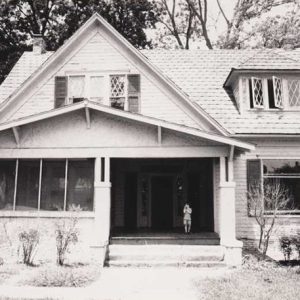 Sam Epstein House
Sam Epstein House 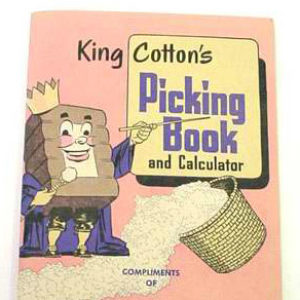 King Cotton's Picking Book
King Cotton's Picking Book 




Comments
No comments on this entry yet.